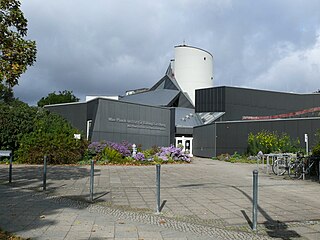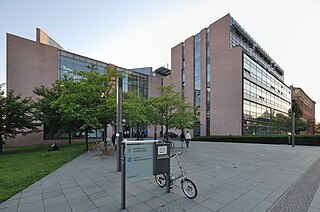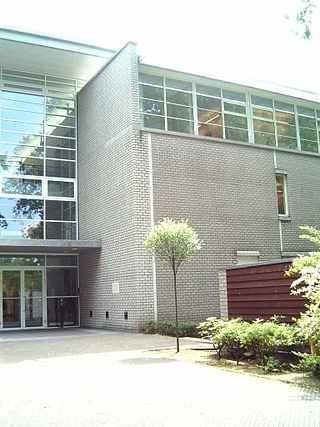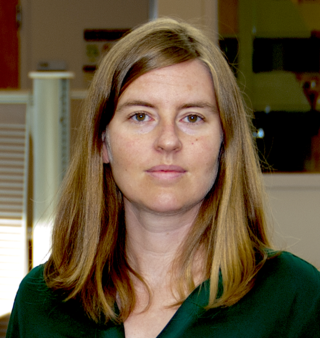Related Research Articles

Svante Pääbo is a Swedish geneticist and Nobel Laureate who specialises in the field of evolutionary genetics. As one of the founders of paleogenetics, he has worked extensively on the Neanderthal genome. In 1997, he became founding director of the Department of Genetics at the Max Planck Institute for Evolutionary Anthropology in Leipzig, Germany. Since 1999, he has been an honorary professor at Leipzig University; he currently teaches molecular evolutionary biology at the university. He is also an adjunct professor at Okinawa Institute of Science and Technology, Japan.
Academia Sinica, headquartered in Nangang, Taipei, is the national academy of the Republic of China (Taiwan). Founded in Nanking, the academy supports research activities in a wide variety of disciplines, ranging from mathematical and physical sciences, to life sciences, and to humanities and social sciences. As an educational institute, it provides PhD training and scholarship through its English-language Taiwan International Graduate Program in biology, agriculture, chemistry, physics, informatics, and earth and environmental sciences.

The Max Planck Society for the Advancement of Science is a formally independent non-governmental and non-profit association of German research institutes. Founded in 1911 as the Kaiser Wilhelm Society, it was renamed to the Max Planck Society in 1948 in honor of its former president, theoretical physicist Max Planck. The society is funded by the federal and state governments of Germany.

The Max Planck Institute for Evolutionary Anthropology is a research institute based in Leipzig, Germany, that was founded in 1997. It is part of the Max Planck Society network.

The Gottfried Wilhelm Leibniz Prize, or Leibniz Prize, is awarded by the German Research Foundation to "exceptional scientists and academics for their outstanding achievements in the field of research". Since 1986, up to ten prizes have been awarded annually to individuals or research groups working at a research institution in Germany or at a German research institution abroad. It is considered the most important research award in Germany.

The Max Planck Institute of Molecular Cell Biology and Genetics (MPI-CBG) is a biology research institute located in Dresden, Germany. It was founded in 1998 and was fully operational in 2001. Research groups in the institute work in molecular biology, cell biology, developmental biology, biophysics, and systems biology supported by various facilities.

The Max Planck Institute of Geoanthropology performs basic research into archaeological science. The institute is one of more than 80 research institutes of the Max Planck Society and is located in Jena, Germany.
David Emil Reich is an American geneticist known for his research into the population genetics of ancient humans, including their migrations and the mixing of populations, discovered by analysis of genome-wide patterns of mutations. He is professor in the department of genetics at the Harvard Medical School, and an associate of the Broad Institute. Reich was highlighted as one of Nature's 10 for his contributions to science in 2015. He received the Dan David Prize in 2017, the NAS Award in Molecular Biology, the Wiley Prize, and the Darwin–Wallace Medal in 2019. In 2021 he was awarded the Massry Prize.
The Max Planck Institute for Plant Breeding Research was founded in Müncheberg, Germany in 1928 as part of the Kaiser-Wilhelm-Gesellschaft. The founding director, Erwin Baur, initiated breeding programmes with fruits and berries, and basic research on Antirrhinum majus and the domestication of lupins. After the Second World War, the institute moved west to Voldagsen, and was relocated to new buildings on the present site in Cologne in 1955.

The Max Planck Institute for Human Development is a social science research organization. Located in Berlin, it was initiated in 1961 and officially began operations in 1963 under the name Institute for Educational Research in the Max Planck Society, before receiving its current name in 1971. Its co-founder and first director was Hellmut Becker. The institute is part of the Human Sciences Section of the Max Planck Society.

The Max Planck Institute for Infection Biology (MPIIB) is a non-university research institute of the Max Planck Society located in the heart of Berlin in Berlin-Mitte. It was founded in 1993. Arturo Zychlinsky is currently the Managing Director. The MPIIB is divided into nine research groups, two partner groups and two Emeritus Groups of the founding director Stefan H. E. Kaufmann and the director emeritus Thomas F. Meyer. The department "Regulation in Infection Biology" headed by 2020 Nobel laureate Emmanuelle Charpentier was hived off as an independent research center in May 2018. The Max Planck Unit for the Science of Pathogens is now administratively independent of the Max Planck Institute for Infection Biology. In October 2019, Igor Iatsenko and Matthieu Domenech de Cellès established their research groups at the institute, Mark Cronan started his position as research group leader in March 2020. Silvia Portugal joined the institute in June 2020 as Lise Meitner Group Leader. Two more research groups where added in 2020, Felix M. Key joined in September and Olivia Majer in October, completing the reorganization of the Max Planck Institute for Infection Biology. Simone Reber joined as Max Planck Fellow in 2023 and now heads the research group Quantitative Biology.

The Max Planck Institute for Psycholinguistics is a research institute situated on the campus of Radboud University Nijmegen located in Nijmegen, Gelderland, the Netherlands. The institute was founded in 1980 by Pim Levelt, and is unique for being entirely dedicated to psycholinguistics, and is also one of the few institutes of the Max Planck Society to be located outside Germany. The Nijmegen-based institute currently occupies 2nd position in the Ranking Web of World Research Centers among all Max Planck institutes. It currently employs about 235 people.
The Max Planck Institute of Psychiatry is a scientific institute based in the city of Munich in Germany specializing in psychiatry. Currently directed by Elisabeth Binder and Alon Chen, it is one of the 81 institutes in the Max Planck Society.

The Max Planck Institute (MPI) for Biology of Ageing, founded in 2008, is one of over 80 independent, non-profit-making institutes set up under the umbrella of the Max Planck Society. The overall research aim is to obtain fundamental insights into the aging process and thus to pave the way towards healthier aging in humans. An international research team drawn from almost 30 nations is working to uncover underlying molecular, physiological and evolutionary mechanisms.

Emmanuelle Marie Charpentier is a French professor and researcher in microbiology, genetics, and biochemistry. As of 2015, she has been a director at the Max Planck Institute for Infection Biology in Berlin. In 2018, she founded an independent research institute, the Max Planck Unit for the Science of Pathogens. In 2020, Charpentier and American biochemist Jennifer Doudna of the University of California, Berkeley, were awarded the Nobel Prize in Chemistry "for the development of a method for genome editing". This was the first science Nobel Prize ever won by two women only.

Janet Kelso is a South African computational biologist and Group leader of the Minerva Research Group for Bioinformatics at the Max Planck Institute for Evolutionary Anthropology. She is best known for her work comparing DNA from previous humans with those of the present.
The Initiative for the Science of the Human Past at Harvard (SoHP) is a trans-disciplinary research endeavor aimed at combining next-generation technology and scientific research with established methods of historical investigation. The Initiative currently sponsors four major projects: 1) The History of Climate Change, in collaboration with the Climate Change Institute . 2) The Max Planck Harvard Research Center for the Archaeoscience of the Ancient Mediterranean (MHAAM), in collaboration with the Max Planck Institute for the Science of Human History. 3) The Isotopic Silk Road. 4) The Digital Atlas of Roman and Medieval Civilizations (DARMC) combining highly detailed data from researchers worldwide.

Christina Warinner is an American anthropologist best known for her research on the evolution of ancient microbiomes. She is an Assistant Professor of Anthropology at Harvard University and the Sally Starling Seaver Assistant Professor at the Radcliffe Institute. Warinner is also a Research group leader at the Max Planck Institute for the Science of Human History in Jena, Germany.
Nicole Lise Boivin is an archaeologist and former director of the Max Planck Institute for the Science of Human History.
References
- ↑ "Inauguration of the Max Planck-Harvard Research Center for the Archaeoscience of the Ancient Mediterranean" . Retrieved 2017-10-17.
- ↑ "Young Investigator Symposium/ PhD Fellowship Opportunity". Nature.
- ↑ "Max Planck Harvard Research Center for the Archaeoscience of the Ancient Mediterranean (MHAAM)". American Association of Physical Anthropology.
- ↑ "Max Planck-Harvard Research Center for the Archaeoscience of the Ancient Mediterranean (MHAAM)" . Retrieved 2017-09-10.
- ↑ "MHAAM Max-Planck - Harvard Research Center". www.shh.mpg.de. Retrieved 2017-09-10.
- ↑ "History under the microscope". Harvard Gazette. Retrieved 2017-10-20.
- ↑ "New collaboration brings together sciences and humanities". Health & Fitness. Retrieved 2017-10-20.